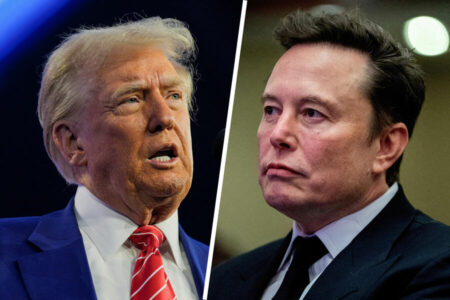Written by Uriel Araujo, Anthropology PhD, is a social scientist specializing in ethnic and religious conflicts, with extensive research on geopolitical dynamics and cultural interactions
The inauguration of Donald Trump’s second term as US President was a spectacle of power, marked by the presence of Big Tech billionaires, including Elon Musk, whose attendance highlighted the growing influence of tech oligarchs in American politics. This convergence of business and politics highlights a complex, often contradictory relationship between Trump, Big Tech, and the so-called “Deep State” —a folk term for what scholar Michael J. Glennon describes as the “double government,” a shadowy network of unelected officials and entrenched interests wielding significant influence over US. policy. One should keep that in mind in light of Musk’s recent announcement of his “America Party”.
Trump’s ties to Big Tech, particularly Musk, reveal a paradox: while the American leader claims to wage war against the “deep state”, his alliances with tech moguls, deeply embedded in the national security apparatus, suggest he is more entangled with it than his rhetoric implies. Big Tech’s historical relationship with the intelligence community is well-documented. Companies like Palantir, Meta, and OpenAI have been implicated in providing backdoors, metadata, and surveillance capabilities to agencies like the NSA, thereby enabling mass data collection that fuels the national security state. Take the recent — and rather underreported decision — to appoint executives from these firms as US Army lieutenant colonels in its Executive Innovation Corps, a program designed to integrate AI and tech expertise into military strategy.
Elon Musk himself has been a prominent Pentagon contractor through SpaceX and Starlink, with billions in defence contracts positioning him as a key player in the deep state he claims to oppose. And, as I’ve argued, AI interests largely shape Washington’s foreign policy in its quest for rare minerals and energy. Thus, Trump’s reliance on such figures complicates his narrative of dismantling entrenched power, to say the least.
Trump’s self-proclaimed war against the deep state — evidenced by his threats to declassify files related to JFK, Epstein, and even UFOs — appears more an attempt to “tame” than to dismantle this shadow government. His feud with Musk, sparked by the latter’s criticism of a $5 trillion spending bill and now his recent announcement of the “America Party,” exposes deeper tensions. Musk’s blunt threats to release “dirt” on political figures, including references to the Epstein case and Trump, suggest a potential for blackmail as a tool of political leverage (as I’ve written), further complicating matters. Epstein, who ran a sexual exploitation ring and was named as an intelligence agent, of course had connections with both Musk and Trump.
So much for Trump’s crusade against elite power; his alliances with Big Tech suggest he is, in fact, in bed with a significant portion of the deep state itself.The international dimension of this dynamic is equally telling. Trump’s administration has shown a keen interest in shaping Washington’s foreign policy to align with Big Tech’s interests, particularly in resource-rich regions critical for AI development.
One may recall that Musk’s feud with Brazilian Supreme Court Justice Alexandre de Moraes over X’s (formerly Twitter) content moderation policies escalated into a broader geopolitical conflict. Moraes, tasked with combating disinformation, ordered X to block accounts linked to Jair Bolsonaro’s far-right movement, prompting Musk to accuse him of censorship and threaten defiance.
Musk may no longer be Trump’s pal, but the Republican President’s support for Bolsonaro, along with tariffs and other developments, aligns with Musk’s narrative and suggests a coordinated effort to influence Brazilian politics: elections and the judiciary This interference, framed as a defence of free speech, reflects a neo-Monroeist strategy to assert American influence, often in service of corporate interests.
Musk’s America Party, announced amid his feud with Trump, introduces further complexity. While positioned as a populist alternative, it risks splitting the conservative vote, potentially empowering Democrats. Critics warn this move could backfire, weakening Trump’s base. Yet, it may serve as a strategic leverage tool to do just that and further pressure Trump’s administration, ensuring Big Tech’s interests remain central to US policy.
By leveraging his platform and wealth, Musk can both challenge and collaborate with Trump, maintaining influence despite their spats.
Suffice to say, the structural power of Big Tech within the double government remains unshaken. Professor Glennon’s framework explains why electoral changes, including Trump’s presidency, tend to fail to disrupt entrenched interests. And Big Tech, with its surveillance capabilities and military contracts, is a cornerstone of this system.
Musk’s role as a Pentagon contractor through SpaceX and Starlink, which supports American operations in regions like Brazil’s Amazon, underscores this very reality. Thus far, Trump’s “war” against the deep state (or part of it) is less a revolution than a renegotiation of power, with tech oligarchs like Musk playing a pivotal role. Again, their presence at the inauguration, integration into military structures, and influence over foreign policy reveal a clear enough truth: Trump may rail against the “deep state”, but remains deeply entangled with it.
Blackmail, AI, mercenary armies; even the sexual exploitation of minors to compromise authorities. This is what the “deep state” is all about and such are its depths. To sum it up, the Musk-Trump feud, while provocative, is in itself a symptom of this deeper entanglement, with personal rivalries masking shared interests.
Be as it may, the relationship between Trump, Musk, and the dual government is doomed to be increasingly complicated, shaped by mutual dependence, strategic blackmail, and the global ambitions of tech empires. In this high-stakes game, the lines between ally and adversary often blur, leaving the American public — and democracies like Brazil — caught in the crossfire of an ugly enough struggle that potentially transcends electoral politics.
MORE ON THE TOPIC:






